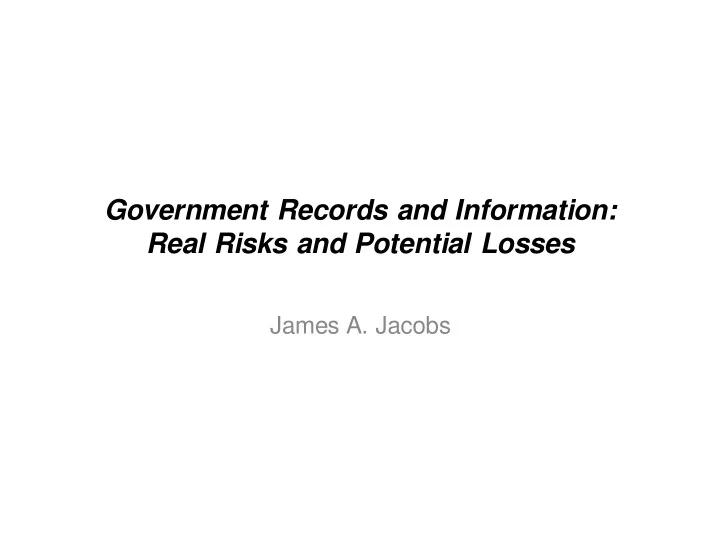

Government Records and Information: Real Risks and Potential Losses James A. Jacobs
3stages.org/crl
Two Themes (1) This is Not about Technology Technology is a tool
Two Themes (2) This is about Value of Libraries Value “Assets” Value (Collections + Services)
Gaps in what we know • no list of born-digital government information • no list of all government websites • no list of preserved born-digital gov-information
What we know (1) FDLP libraries successfully preserved millions of volumes of non-digital government information
Information Responsible Life-cycle Institution Creation Individual agencies Production GPO Preservation FDLP Libraries
What we know (2) Most born-digital government information is not held, managed, organized, served, or preserved by libraries
1983 INS v. Chadha, 462 U.S. 919 - Keeping America Informed The U.S. Government Printing Office 150 Years Of Service To The Nation.
1993 Public Law 103-40 The Government Printing Office Electronic Information Access Enhancement Act
What we know (3) The scope of born-digital government information being produced far outpaces what is being preserved
The simple fact is: no one knows how much born-digital U.S. Federal government information has been created, or where it all is, or how much of it is being preserved.
Issues • Versioning • The need for persistent URLs • The need for temporal context • E-government issues • Relying on government for preservation (and free access) • Selection • Collections need Services
Who Should Preserve? • Government alone • Government with non-government partners • Non-government without government cooperation
Methods of selection • Broad web harvesting • Focused selection • Digital Deposit
Framework • Preservation and Access • Collections and Services • Focus on user-communities first • Unique collections for unique communities • Participation of every library • Cooperation and Collaboration
Summary • We can: – Preserve born-digital government information (the technology exists) – Every library can participate (the entry-cost is low) – We can add value to the information by building collections of use to our communities. – We can add value to our libraries by providing collections + services for our communities.
Recommend
More recommend